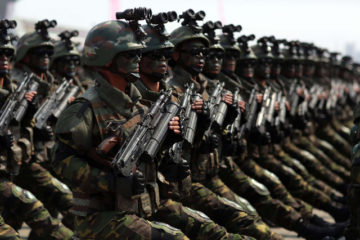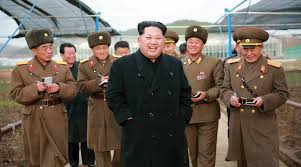Trump Boosts U.S. Cyber Command’s Status in Military Chain

published Aug 18, 2017 1:28:35 PM, by Nafeesa Syee
(Bloomberg) —
President Donald Trump is boosting U.S. Cyber Command’s status in the sprawling military hierarchy in a move intended to bolster its role defending against hacking attacks and in fighting Islamic State militants in cyberspace.
Trump elevated Cyber Command to a “unified combatant command” Friday and directed Defense Secretary Jim Mattis to recommend someone to lead the organization. The new command will “strengthen our cyberspace operations and create more opportunities to improve our nation’s defense,” the president said in a statement.
The step helps “streamline command and control of time-sensitive cyberspace operations by consolidating them under a single commander” with the requisite authority, Trump said. It also will ensure cyber operations are “adequately funded,” he said.
Until now, Cyber Command, founded in 2009, was under U.S. Strategic Command, which oversees nuclear weapons and space programs.
“This step will make the command even more agile and strengthen its voice in the department,” Defense Department spokeswoman Heather Babb said in a statement.
The U.S. already had nine unified commands defined by their geographic or functional responsibilities. They include U.S. Central Command, which oversees Middle East operations, and U.S. Special Operations Command, which is responsible for counterterrorism efforts and commando forces.
Acquisition Authority
The biggest practical impact of Trump’s decision will be giving Cyber Command its own acquisition authority, according to Bob Stasio, a fellow at the Truman National Security Project and former chief of operations at the National Security Agency’s Cyber Operations Center.
“Before, they had to go through extra layers of bureaucracy, back through Stratcom, to get any type of contracting approved,” Stasio said in an interview. “Now they have their own ability to do acquisitions.”
Navy Admiral Michael Rogers has played a dual role overseeing both Cyber Command and the National Security Agency. The president directed the Pentagon to examine separating the command from the NSA, a move that’s long been under discussion.
The command’s new position will help centralize operations, according to Mike Viscuso, chief technology officer of Waltham, Massachusetts-based cyber firm Carbon Black Inc. and a former NSA analyst. It will force collaboration and information-sharing across military and intelligence organizations, he said.
“You’re seeing the government moving into a more collaborative nature, especially around cyber because it moves so fast,” Viscuso said.
To contact the reporter on this story: Nafeesa Syeed in Washington at nsyeed@bloomberg.net To contact the editors responsible for this story: Bill Faries at wfaries@bloomberg.net Larry Liebert, C. Thompson
copyright
© 2017 Bloomberg L.P





No Comment